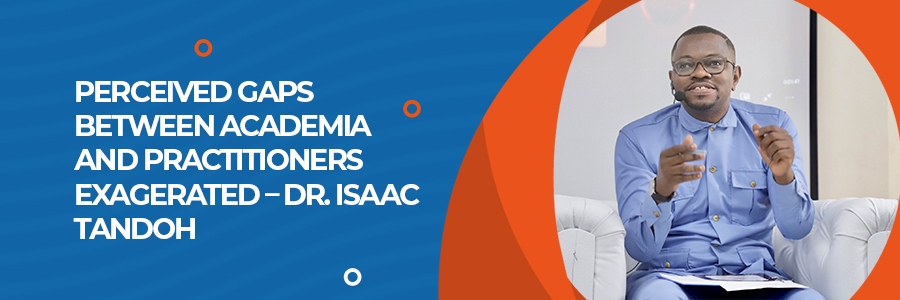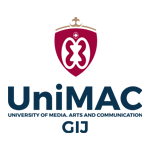
Dr. Isaac Tandoh, a Lecturer with the Department of Public Relations at GIJ has stated that the perceived gaps between academia and practitioners in the fields of Public Relations and Marketing Communication are only exaggerated. According to him, theories evolve hence students need to apply theories in structured contexts. He added that several academics consult for industry and that enhances knowledge exchange between the world of work and the lecture hall. Dr. Tandoh said this during the maiden GIJ Academic-Practitioner Conference organized by the Faculty of Public Relations, Advertising and Marketing of the Ghana Institute of Journalism. Under the theme “The PR & Marketing Communications Practice & Taught: Real or Perceived Gap?”, the conference was organized to develop stronger relationships and reduce the gaps between academia and industry.
The Conference brought together experts from both academia and the corporate world who engaged in conversations about the gaps between public relations and marketing communications (taught and practice) and how academic research and theories could impact practice.
The event saw a filled auditorium as students enjoyed the privilege to listen to speakers like Dr. Abena Animwaa Yeboah-Banin, HoD, Department of Communication Studies, University of Ghana, Paa Kwesi Forson, Head, Public Relations, Global Media Alliance, Cynthia Ofori-Dwumfuo, Group Head – Marketing & Corporate Affairs, Hollard Ghana, Benjamin Alpha, Corporate Communications Professional, Sophia Kujordji, Chief Corporate Communications Officer, Jospong Group of Companies, Dr. Isaac Tandoh, Lecturer, Faculty of Public Relations, Advertising and Marketing, GIJ, Joyce Ahiadorme, Head of Transformation and Communications, Texstyles Ghana Limited and Dr. Albert Anani-Bossman, HoD Department of Public Relations, GIJ.
Head of Corporate Communications at Jospong Group, Madam Sophia Kujordji acknowledged that there are perceived gaps between academia and practice. However, there are real ones but continuous engagements like the attempt made by GIJ will enhance closer ties for more gains for both stakeholders. She urged students to engage in internships and volunteerism to allow them to settle effortlessly into the corporate world.
Ms. Joyce Ahiadorme on the other hand mentioned that industry is result oriented and powered by actions. She highlighted that the ability to apply theories learned to real work will guarantee success.
Another speaker from the academic side of the divide, Dr. Abena Yeboah-Banin stated that knowledge sharing is the primary purpose of educational institutions. However, such institutions are being denied the necessary resources to prepare students for the job market. ” There are two key resources that I have noticed that the academic is being denied. First is the resourcing for running institutions and the teaching and learning environment. Increasingly, academics are struggling to get funding and other resources to push their research there is the expectation that the academic should perform magic and still be able to produce people who are ready for the market. The other resource is the individual student’s readiness to be moulded. Unfortunately, we are dealing with students who are not driven. All they came are fixated on is the certificate. They step out with it into the marketplace and are not able to deliver.”
The thought-provoking conference sparked questions from students, while the renowned practitioners provided responses to satisfy their curiosities.
In his closing remarks, the Rector of the Institute, Prof. Kwamena Kwansah-Aidoo indicated that stakeholders outside academia tend to create some myths around theories. He alluded to the fact that theorizations occur even in practice, and thus encouraged practitioners and academics to advance closer ties that will inform activities in the academy, such as the creation of new programs, the mentoring and advancement of academic careers, and the exchange of research findings, among other that the two ‘cultures’ can share for the betterment of humanity and the country. In attendance was the Deputy, Prof. Eric Opoku Mensah, Deans of Faculties, Heads of Departments and Units as well as students.
